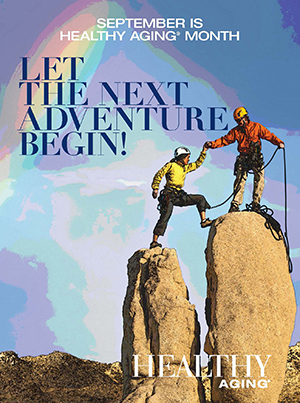
Photo: Deposit Photos
By Dr. Brent W. Laartz
As we age, for some people the strength and memory of our immune system begins to wane, and this can have wide-ranging consequences. This decrease in immune function is worse if our health is not optimal, such as with obesity, diabetes, or other chronic diseases.
Let’s face it, our bodies are bombarded on a daily basis by viruses, bacteria, and fungi from all over our environment. You may not be able to see the viruses on that door handle, the bacteria on your hands, or the mold spores floating in the air from the construction site that you walk by, but they are all there every single day. Compound this with the increased bacterial and viral contamination of just about everything we touch when we travel overseas, and disaster is inevitable.
Keep Your Immune System Strong
The first task that we all need to accomplish is to keep our immune system strong, which involves a good diet and cardiovascular exercise.
Diet
A low fat diet with plenty of B vitamins and vitamin C should suffice.
Nix the Nicotine
Smoking cigarettes poisons our immune system cells and is already taboo for other important reasons.
Check Your Body Mass Index
Those with a body mass index less than 28 have a decreased risk of multiple types of infections.
Are Your Vaccinations Up-to-Date?
Vaccinations are important but I will not mention all of the necessary immunizations, except two.
In middle-age healthy persons, the main vaccination to remember is the Tetanus-diphtheria-acellular pertussis (Tdap for short). Everyone should have a tetanus vaccination every 10 years, and within 5 years if you have a skin puncturing injury.
In the past, the main vaccination that was given was Tetanus-diphtheria (Td for short). Now the Tdap is available which includes pertussis or whooping cough protection. Pertussis has become very common in persons 40-50 years of age because for most of us, the last time we had a pertussis vaccination was when we were somewhere between 6 and 12 years of age. This additional protection may not only protect you, but it could also protect any babies in your family. There are approximately 50,000 diagnosed cases (with many more undiagnosed cases) of pertussis every year in the United States with 20 deaths mostly in babies.
The other vaccination that may be more important for your surrounding family than for you, is the influenza vaccination. We have all heard that if you receive the influenza vaccination, you will be less likely to miss work and your influenza illness may be less severe. In addition, you may be less likely to spread it to an older or younger family member who would be more likely to die because of it. Think of this vaccination if you have an elderly or infant family member who could be at risk of a more serious form of influenza if they caught it from you.
MRSA and Germs
Methicillin Resistant Staphylococcus aureus (MRSA) and other skin infections have increased over the past two decades and the peculiar characteristic of this illness has been that healthy people are at a similar risk of having this disease to older persons.
MRSA is spread from person to person by physical contact. Even shaking hands can spread the bacteria. Once the bacteria is on your skin, you are now colonized, and have a small risk of the bacteria invading under your skin to cause an infection. Common places to come in contact with this bacteria are gyms, daycare centers, and schools. To protect yourself from this illness you should frequently wash your hands, preferable with an alcohol hand sanitizer. In addition, wipe off the exercise equipment and common areas at schools with a sanitizing wipe.
Tips for Foreign Travel
During travel to overseas countries, we need to be cognizant of the increased contamination of the food we eat, the water we drink, and the environment that our skin comes in contact with. This contamination can be with bacteria such as Salmonella and E coli in water and foods or it can be parasites on the ground or in foods. It can also be parasites such as malaria or viruses such as dengue, chikungunya, and Zika virus in the mosquitos that bite.
Tips to avoid infections during travel revolve around two important evils to avoid – water and insects.
Water not only includes the water we drink but also the water that food comes in contact with and the water that the ground comes in contact with. When traveling, only drink bottled water and watch for bottled water that has been refilled and never use ice in your drinks.
Brush your teeth with bottled water. Any food you eat should be piping hot when it touches your lips. This minimizes the possibility of food poisoning. Food that is grown in third world countries comes in contact with livestock manure (and human waste) that has multiple pathogens lurking to destroy your vacation. Cooking will inactivate most of these. Also, never walk barefoot, even in your hotel room or in the shower.
The main insect to avoid is the mosquito. These tiny biting insects can spread malaria, Yellow Fever, Dengue, Chikungunya, Zika virus, and a whole host of other diseases.
Use only mosquito repellants that contain at least 20% DEET. Others are not effective enough to prevent you from developing dangerous diseases. In addition, you can use permethrin on your clothes but follow the directions closely. Listen to your medical provider regarding taking malaria preventive medications. Ticks and flies can also spread diseases in some countries.
Center for Disease Control Offers Travel Health Information
Lastly, visit with a travel clinic every time you travel overseas. The advice and vaccinations they recommend could be a life saver. You can do some research by going to the Center for Disease Control’s (CDC) website, but the expertise to interpret this is in the hands of professionals. You can research the dangers of the location of your travel on this site and there is information on malaria risk, Yellow Fever, and emerging diseases.











